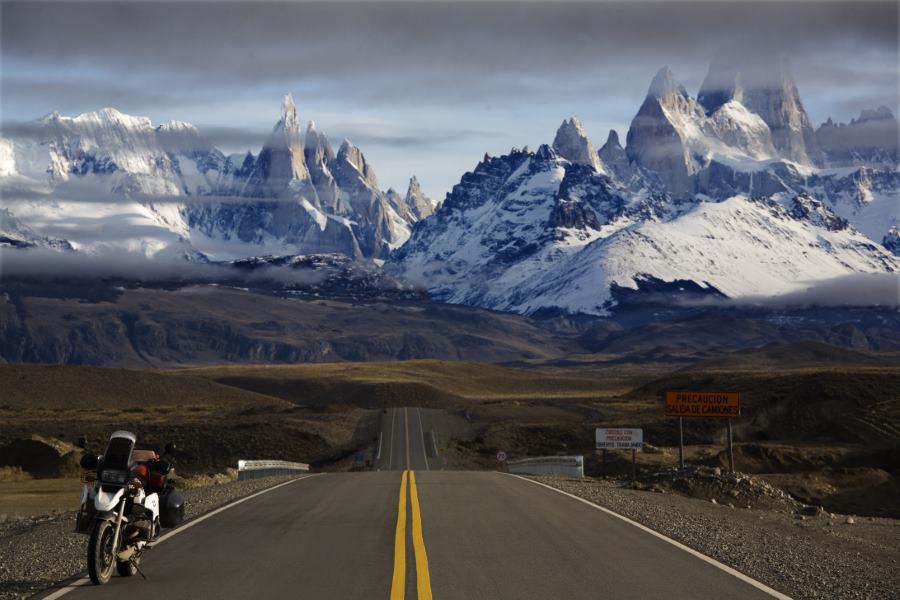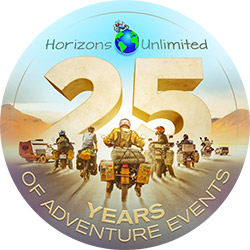“How much will this cost?” and “where do I find the money?” are the first questions people generally ask. This was the primary question we had about other people’s long-term, overland trips. “How much and how did you pull it together”.
We will explain what we did. Keep in mind the budget component is different for everyone. A trip like this can be done on the super cheap (a high percentage of wild camping, couch surfing, and cooking your own food) or the more expensive (stay in the best hotels every night and eat out for every meal) and of course everything in-between. The best answer to how much – It Depends.
To begin, let’s start with the question how much money do we need? The second is how to get it?
How much do we need for our motorcycle trip around the world?
We learned a lot from Life Remotely as their website is a wealth of information and I suggest everyone read it in the beginning of their planning. I used their budget template as a place to develop a baseline budget and then I had fun with excel tweaking and manipulating. I will admit that I am a bit of an excel nerd and enjoy making interactive/assumption driven spreadsheets. Below I have included my own spreadsheet along with instructions. The budget is driven by assumptions, so first you have to ask yourself a series of questions and attempt accurate answers. As the plan develops assumption/answers will likely change and this is normal, you have to start somewhere:
Living Expenses
1. Are you traveling alone or as a pair or in a group?
a. We are traveling as a pair along with an 11-pound dog. We have learned that the number of people traveling together has very clear budget implications. For example, in Mexico it is generally less expensive to get a bed in a hostel if you are traveling alone but less expensive to camp if you are a pair.
2. How many days in each country?
3. How much camping versus hotel versus couch surfing? What type of camping (wild, official campgrounds, a mixture)?
a. For us the answer was about 50% camping and 50% hotel. You need to assess your own comfort level with the different options you have and try to be honest with yourself. If you really don’t like to camp then don’t plan for it or only plan to camp as an emergency. We assumed that the majority of our camping would be official campgrounds because we wanted some of the amenities (internet, flush toilets, access to electricity, places to meet other overlanders) as well as the additional security. We will wild camp later in South America once population density thins out.
4. How much will you cook versus eat out? What will your average spend be per day? If cooking for yourself, how much will you shop in the local markets versus grocery stores?
a. For us the answer was that we will cook about fifty percent of the time and have a mix of shopping between local markets and grocery stores.
5. How many miles to drive and what is your average miles/gallon?
One-time expenses
1. What type of special excursions will you make? Will you go on an Antarctic cruise, visit the Galapagos islands, or go for a zip-line adventure?
2. One-time expenses such as border and visa fees, insurance requirements per country, etc.
3. Shipping expenses. Are you shipping your vehicle between continents? Will you drive/ride your vehicle home?
4. Vehicle maintenance? Will you ship yourself tires or will you use what is locally available? Oil changes? Are you bringing spare parts with you or will you need to purchase along the way?
After we answered these questions our next step was to make assumptions concerning how much those items would cost on average. I found detailed information about average and one-time expenses from Life Remotely as they provided their original budget numbers as well as expense reports per country. I am providing our average expenses per country as well
(Expense Reports).
There are no ‘wrong’ answers in preparing your financial assumptions. Overland travel is unique to the individual and costs should be based on your thoughts and research.
Now – put it all together
Please download:
S&M Boiler Works Budgeting Spreadsheet Template
This is a very simple spreadsheet and has some formulae built in so that it is easy to change assumptions. The information in the spreadsheet is from our initial assumptions for the Americas. Remember this is all based on 2 people.
Step 1: List the countries you will travel
Step 2: Make assumptions for percentage time camping, hotel, and other
Step 3: Estimate number of days in each country
Step 4: Estimate costs for the four primary categories for each country (e.g. hotels are more expensive in the US than Mexico)
*Food per day inclusive of grocery and restaurant – for two people we estimated $20/day in all countries but the US. A more accurate accounting would be $25/day. If you are a big drinker then take this into account.
*Camping – for two people we estimated generally $15/night (higher for the US and a bit lower for some other countries)
*Hotel – this ranges per country with the US being the highest.
*Additional – this is a catch all category and for us includes things such as communication costs (SIM cards, data plan), pet costs (food, vet, treats), incidental shopping, etc. – this is based on $10/per person so $20/day.
Step 5: Fuel estimates. Fuel is not dependent on number of days but on number of miles (kilometers driven) so you need to estimate number of miles per country. The formula for fuel is based on cost/gallon, miles expected, and average miles/per gallon of your vehicle. We estimated two bikes, at 45 miles per gallon. The miles per country were purely a best guess based on country size and anticipated route.
What we learned from our initial spreadsheet that focused on North, Central, and South America is that we would require $75/day for all day-to-day living expenses ($27,000/year for two people so $13,500 per person) plus funds for start-up (equipment, bikes, etc), borders and visas, excursions, shipping, repairs, additional/replacement gear, and re-occurring expenses (medical insurance, storage, student loan payments). We planned a 3-year trip. I then lowered our day-to-day living budget to $24,000/year ($12,000 per person) that equates to $65/day.
I track all our expenses (living, one-time, and re-occurring) and evaluate our spending based on averages. We spent above our $65/day average in the US but since our average expenses in Mexico, Belize, and Guatemala have been lower our overall living expenses are within the $65/day goal. We have allocated funds for the one-time and re-occurring expenses but I also hope that we can keep as much of those within our goal daily budget too. But, it is not required.
This type of spreadsheet can let you play with how answers affect how much money you need. For example, what happens if you change camping to 10% of the time? Therefore this type of analysis can help you plan and choose.
Equipment – start-up expenses
There are also decisions about equipment and again the answer for what to get is – it depends. It depends on some of the same things you asked yourself for the budget. Will you be camping and how much which will then have you think about gear for that activity. If you only plan on camping as an emergency then a very small tent, sleeping bag, and sleeping pad will likely do just fine. If you don’t plan on cooking then you will not need to bring/buy a stove and kitchen tools.
We knew that we each wanted our own motorcycle and that it would be best if the bikes were the same make and model. By having the same bike we have one pool of spare parts, tools, and know-how needed to keep both bikes healthy. We also knew we wanted dual-sport style motorcycles and because of our height differential there was really only one bike that was easily modifiable to fit both of us and was within our budget. We chose lightly used Suzuki DR 650s. We also knew having less expensive bikes would cut down on costs for a carnet and import duties. We were able to find Shannon’s bike (Zippy) for a great price, the base cost from Craig’s list was $2,900. Mike’s bike was more expensive $4,900 and then we outfitted both bikes (gas tanks, suspension, bags, etc) this work is all detailed in Mike’s bike prep post. We knew we would be camping at least half the time so we invested in a good quality, large tent and other high-end camping items (many of which we purchased solely for our comfort). See gear post. Our camping kit is fairly extensive and we could get by with a lot less but we choose not to.
The important point is that your travel kit should correspond to your comfort level and activities/type of travel. For example, we do not plan on being professional photographers so we did not invest in high-end camera equipment. Our camera is mid-range without additional lenses and kit but it does everything we need it to. For some people this camera would be too basic.
The goal during this step in your budget development is to list out what items you will need to purchase for your trip and how much it will likely cost. You may have most of the items already so this list/expense could be quite small if you have been overlanding for awhile already. Our requirement was probably somewhere in the middle with the highest expense being the bikes and bike preparation (tires, crash plates, bags, suspension, etc).
Re-occurring expenses
There are re-occurring or at home on-going expenses that will be different for everyone. I have student loans that I continue to pay so that monthly cost was taken into account in our savings goal for the around the world trip. Our other on-going expenses are insurance for household goods in storage and medical insurance for both of us. We also own a house that is rented out and it currently covers its own costs (the rent covers the mortgage, insurance and property management) but we were sure to set some money aside to pay our mortgage directly if the home goes unrented.
Medical insurance: Yes, we have it and yes, the cost adds up. We have full medical insurance that includes medical evacuation and will cover us for accidents and diseases. The plan we chose covers us worldwide including the US up to $5million USD per person. We also chose a plan with a very high deductible ($10,000) because we knew if we are actually taping into our insurance something major has occurred (accident or disease) and at that point $10k will be a drop in the bucket and we will charge it to a credit card if needed. We purchased our insurance through IMG Medical Insurance Group and our insurance plan costs about $1,800 a year for both of us. I found Life Remotely's discussion on insurance companies very helpful and then reviewed all the options myself and made some phone calls. If you are a US citizen the plan that we have doesn’t meet the US requirements but if you are out of the country the majority of the year you are exempt. We are of an age and maturity in our lives that will not allow us to take the risk of being uninsured. However, this was not the case when we were younger.
You know how much $$$ you need – now how do you get it?
We did this the old fashioned way – we saved our money. We did this by making a plan about our day-to-day lives while both working at our careers. There wasn’t a magic bullet for saving our nest egg but again this can be done many different ways. Some people sell everything, take a loan, work along the way, and others use pensions, trust funds or inheritance.
Step 1 – How much do you need: Our first step was deciding on our goal amount that was based on our budget and that we proposed to do about a 3-year trip. We listed out the annual/daily expenses, the one-time expenses including additional excursions we might want to do, and reoccurring expenses (medical insurance, student loan payments, etc), and some buffer. We also listed out gear costs such as new bikes (new to us), bags, camping equipment, etc.
Step 2 – Save your money: Then we looked closely at our current expenses against our income to figure out what was the maximum we could save every month. We also listed items we could potentially sell (we sold three motorcycles which ended up paying for the two Suzuki DR650 motorcycles). We set up a separate savings account at an entirely different bank with a great interest rate (Capital One 360) where we transferred money every pay period. That account was hard to get money out of because once you initiate a transfer it takes 3 business days for the funds to reach your account. We thought of funds in that account as deep storage and untouchable. Then we saved. During the years it took to save the money we planned and schemed about where we would go and did other background research.
Step 3 – Pick a date: The other key factor for making this trip possible was picking a date we would leave. Once that date was in place it made everything much more real and that gave us more discipline to save. At this point, we really cut out any extra expenses (no more cable tv, no new clothes, pack lunch to work, no coffee out in the afternoon, etc). We both had decent jobs so we lived on one salary and saved the other but our jobs were at non-profits so we weren’t getting rich fast and saving for this trip took a considerable amount of time.
Step 4 – Items to sell: We did sell many of our belongings as well – anything that had value which included our car, truck, most of our motorcycles, and some of our furniture. We sold most of our books and I even sold some shoes (this was hard for me but I needed a new pair of motorcycle boots). We carefully went through our “things”. We do have a storage unit that includes artwork, photographs, tools, and other items. But, I would say that we let go of at least 90% of our crap. Once we started shedding our worldly possessions it was liberating.
Step 5 – Rent or sell your house (if applicable): We chose to keep our house. We purchased the house over twelve years ago and knew that it was a great investment home in Seattle. Furthermore, we knew that it would be unlikely we could afford to purchase a home in Seattle again and that the money we could potentially earn from a sale wasn’t worth it. Our goal was to rent the house so that it would cover all its own expenses (mortgage, insurance, taxes, and house manager) and we were lucky enough that that happened. If the home goes unrented at any time then that is something we will have to cover from our travel/contingency budget. We just hope it doesn’t occur.
Step 6 – Lower your current expenses: In order to help save money we actually moved out of our home five months before we left on our trip. We did this to help save but also we knew that if the home went unrented for more than the planned month (so we could paint and clean) it would be easier to cover the mortgage and rent while we were working. We found a great place through AirBNB where we lived for five months and it also lowered other monthly bills such as water, sewer, electricity, etc. because it was all included in our rent. As we sold vehicles that lowered our insurance costs which meant more money to save.
Saving money can be daunting but it is doable. I think the important piece is to keep your eye on the prize. I often would think to myself do I really need this right now or would I rather have another few days on the road. I also kept myself out of shops so I wouldn’t be tempted.
This was originally posted on our website:
S&M Boiler Works | Promoting our vision of sustainable unaccountability

















 71Likes
71Likes








 KUDOS! I wonder what your jobs are in "real" life?
KUDOS! I wonder what your jobs are in "real" life?  from supermarkets/shops... Thats about as far as our accounting goes.
from supermarkets/shops... Thats about as far as our accounting goes.






 Hybrid Mode
Hybrid Mode









